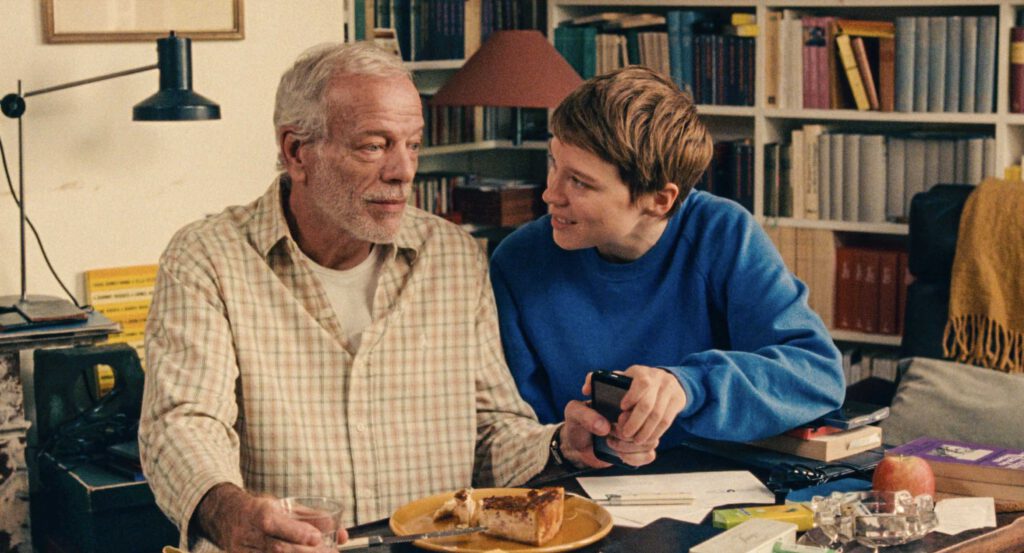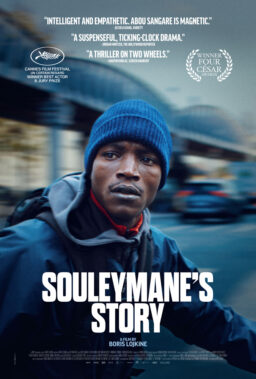Why is Mia Hansen-Løve’s “One Fine Morning” not in competition this year at Cannes, but instead showing in the Directors’ Fortnight program? You have to wonder, given that Hansen-Løve’s “Bergman Island” competed here last year and got a pretty good reception (though not quite from me). When I saw “One Fine Morning,” my theory was that it had been deemed too close to another of last year’s films, François Ozon’s “Everything Went Fine.” Cannes can only show so many movies about daughters preparing for their fathers’ deaths.
But now that I’ve seen Arnaud Desplechin’s “Brother and Sister,” which is competing, I’m even more curious. Perhaps having both “Brother and Sister” and “One Fine Morning” contend for this year’s Palme would have been a bit too much, but the movies complement each other well. “One Fine Morning” is about a translator coping with her father’s increasing debilitation from disease even as a new romance enters her life. “Brother and Sister” tells the story of two siblings who for 20 years have borne an irrational hatred for each other, until their parents’ grave injuries in a road accident make mutual avoidance untenable. The protagonist’s lover in “One Fine Morning” and the brother in “Brother and Sister” both happen to be played by Melvil Poupaud.
“One Fine Morning,” shot on film by Denis Lenoir, is the more shapely and easier to like of the two movies. Léa Seydoux plays Sandra, a translator and single mother whose father, Georg (Pascal Greggory), was a philosophy professor. But he has Benson’s syndrome, which has caused his mental acuity and vision to slip and led to the point where he can no longer live alone. Over the course of the film, Sandra and her mother (Nicole Garcia), who is divorced from Georg, keep moving him from one care facility to another, in the sort of ordinary but wrenching hassle that anyone who has watched a relative decline will recognize. And because Georg’s life and career were entirely about thinking, it’s almost as if he has already left. “I feel closer to my father with his books than with him,” Sandra remarks at one point.
But while all this is going on, Sandra finally makes a move with Clément (Poupaud), a cosmochemist and friend whose chemistry with her would be visible to the audience from the stratosphere. He also happens to be married with a son, and exactly whether the affair can or should last is a question Hansen-Løve answers, then reconsiders, then reconsiders again, without judging either party. “He can’t be both your boyfriend and your friend,” Sandra’s daughter, Linn (Camille Leban Martins), tells her. “Don’t overthink it,” Sandra replies—which sums up the movie’s sensibility perfectly. It’s a film about learning to live with indeterminacy. Sandra’s father is both there and not there. Passion may be real, but it is also situational.
If the ambiguities of “One Fine Morning” in some ways recall Éric Rohmer, “Brother and Sister” revives the strain of Cassavetes that critics recognized in early Desplechin films like “Esther Kahn.” For one thing, Alice (Marion Cotillard), an actress starring in a play based on James Joyce’s The Dead, befriends a Romanian woman (Cosmina Stratan) who recalls the smitten fan at the start of Cassavetes’s “Opening Night.”

But more to the point, the dynamic between Alice and her brother Louis (Poupaud)—siblings who have refused to see each other for 20 years—is best explained as a folie à deux, a state that defined the lives of Cassavetes pairs from Minnie and Moskowitz to Mabel and Nick. Alice and Louis compulsively avoid each other yet find ways to inflict wounds from afar, writing nasty books or responding with libel lawsuits over the writing. Another brother, Fidèle (Benjamin Siksou), the only sibling Alice will acknowledge, becomes a kind of hapless go-between.
To enjoy “Brother and Sister,” it’s necessary to roll with Desplechin’s eccentric branching subplots and to accept that the movie is not meant to be read in a literal way. The accident that sets the plot in motion—involving a car and a truck losing control on a quiet woodland road—surely signals that the movie is operating on an exaggerated level. Indeed, the hatred between Alice and Louis is explicitly framed in biblical terms. Which makes his low-key way that Desplechin and Julie Peyr, his co-writer, resolve it seem all the lighter. “Brother and Sister” is absolutely bizarre, but it’s also a return to form. No other director does crazy quite like Desplechin.

The documentary “Mariupolis 2” plays more like a series of rushes from Mariupol, Ukraine, than a finished film, because it technically isn’t one. The director, the Lithuanian documentarian Mantas Kvedaravičius, was killed in Mariupol, Ukraine, in late March while working on the project. (“Mariupolis,” his earlier documentary on Mariupol and the fighting in Eastern Ukraine, premiered in 2016.) Kvedaravičius’s fiancée, Hanna Bilobrova, and the editor on the first “Mariupolis,” Dounia Sichov, assembled the footage Kvedaravičius had shot at the time of his death into this form, announced as an addition to the festival just a few days before opening night.
Given how difficult communication with Mariupol has been for much of the war, the documentary is a vital dispatch. It shows smoke-filled skies and neighborhoods reduced to rubble. People pray in dimly lit shelters that may not be around for long, cook on flame pits outside (with no houses, let alone kitchens, to work with), and futilely try to clean up the area while ongoing mass devastation continues.












